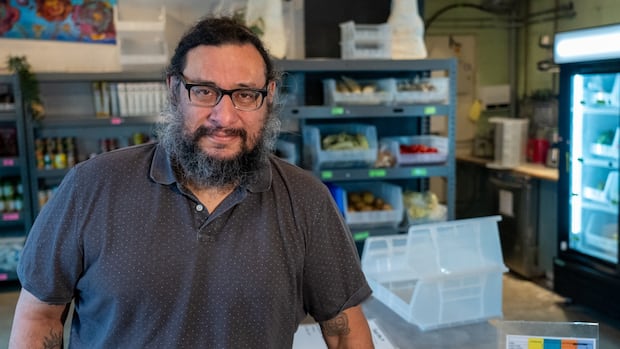OttawaOttawa city council recently passed a motion that proposes to address the root causes of food insecurity — including barriers to employment and affordable housing — in an attempt to keep people from going hungry.Local food banks have been calling for emergency to be declaredCBC News · Posted: Sep 29, 2025 4:00 AM EDT | Last Updated: 2 hours agoOttawa city council looking to tackle food insecurity by addressing root causesCouncil recently passed a motion to address food insecurity by looking at how rising unemployment and social assistance programs are failing to keep pace with inflation. In the meantime, local resources like the Parkdale Food Centre are trying to offer clients a more dignified experience.As food insecurity continues to rise in Ottawa, city council is putting renewed attention on underlying issues that lead people not to have enough food on the table, like barriers to employment and affordable housing.Last week, council unanimously passed a motion put forward by Alta Vista Coun. Mary Carr in the hopes of achieving that goal.”We want to make sure that, instead of just continuing to put Band-Aids on solutions, that we’re actually addressing those root causes,” Carr said.Food insecurity has risen in Ottawa for the last three years in a row, according to data from Public Health Ontario. In 2024, more than a quarter of both individuals and households in Ottawa didn’t have enough to eat.Food banks have been sounding the alarm for months, and in November 2024 the Ottawa Food Bank called on the city to declare a food insecurity emergency.The city has not done that, but a spokesperson for the mayor’s office said the motion had been “developed in consultation with the Ottawa Food Bank and other food security partners, in response to their campaign.”Carr says she doesn’t “really see a lot of value in declaring an emergency.””They declared a climate change emergency and what we saw was that there was no change essentially in our emissions,” she said.”I think actions are more important than words, which is why I was really supportive of this motion that really sets forward a path for action.”What does this motion do? The motion plots out five steps the city would take to address food insecurity’s root causes.Three involve advocating to the provincial or federal governments for changes, like strengthening social support programs like the Canada Disability Benefit. Changing things that go beyond the municipality’s jurisdiction are essential to solving food insecurity, Carr said.The two other steps are ones the city would take: Collaboration among city departments to implement the poverty reduction strategy, a plan council approved last October. The expansion of investments in “deeply affordable and supportive housing as essential to reducing food insecurity,” part of an update to the city’s 10-year housing and homelessness plan that’s scheduled for the first quarter of 2026. Vladimir Solorzano, manager of the grocery program at the Parkdale Food Centre, said they’ve seen a steady increase in clients since 2022. (Francis Ferland/CBC)Vladimir Solorzano, the manager of the grocery program at the Parkdale Food Centre, agrees that a “multi-pronged approach” from all levels of government is needed.Solorzano said he sees the ramifications of food insecurity every day, with the centre’s number of clients having doubled over the past three years.Around 1,600 people each month come through their doors, he said.”Having this situation in the capital of a G7 country, it’s really concerning,” he said.But unlike Carr, Solorzano does believe the situation in Ottawa merits the emergency label.”If we are serving twice as [many] people as before — and when I attend meetings with other agencies within the network the message is the same — [then] yes, for sure,” he said.Chantale Portelance, a client at the Parkdale Food Centre, said the point-based grocery store model offers her the ‘dignity’ to choose what she’d like to eat, but unfortunately inflation has caused some items to cost more. (Francis Ferland/CBC)Tough decisionsChantale Portelance is just one client of the grocery program who’s been forced to make difficult decisions in recent years. “Do you pay rent or do you buy groceries?” Portelance asked. “I know I was evicted because I bought my son’s groceries instead of paying rent, and we lived in a tent for two months because of it.”Portelance said she’s sat in on meetings at city hall, and doesn’t buy that it will truly take a decade to end homelessness and hunger in Ottawa.”They have the sources to do it now,” she said. “But it’s all about the money and making the rich richer.”The city told CBC that staff are now reviewing all of the motion’s directions and how they can be incorporated into the poverty reduction strategy.A “food security forum” is also planned for the end of October, said Carr, where the city’s partners will come together and discuss the situation.READ | Coun. Marty Carr’s full motionWith files from Anchal Sharma
Thursday, 5 Mar 2026
Canada – The Illusion
Search
Have an existing account?
Sign In
© 2022 Foxiz News Network. Ruby Design Company. All Rights Reserved.
You May also Like
- More News:
- history
- Standing Bear Network
- John Gonzalez
- ᐊᔭᐦᑊ ayahp — It happened
- Creation
- Beneath the Water
- Olympic gold medal
- Jim Thorpe
- type O blood
- the bringer of life
- Raven
- Wás’agi
- NoiseCat
- 'Sugarcane'
- The rivers still sing
- ᑲᓂᐸᐏᐟ ᒪᐢᑿ
- ᐅᑳᐤ okâw — We remember
- ᐊᓂᓈᐯᐃᐧᐣ aninâpêwin — Truth
- This is what it means to be human.
- Nokoma










